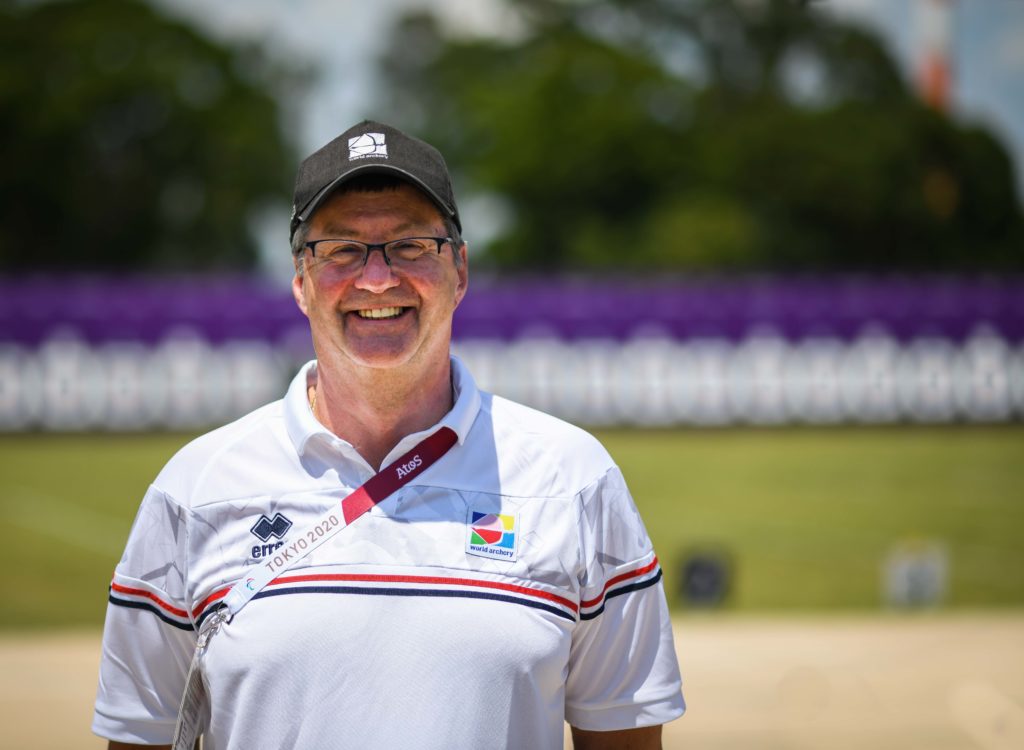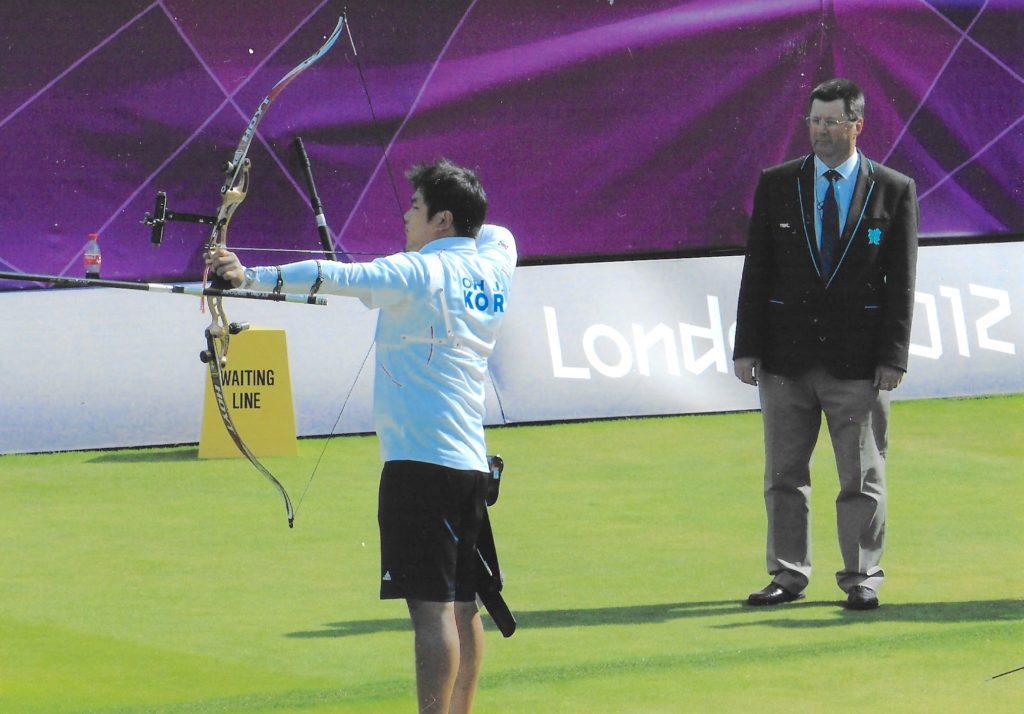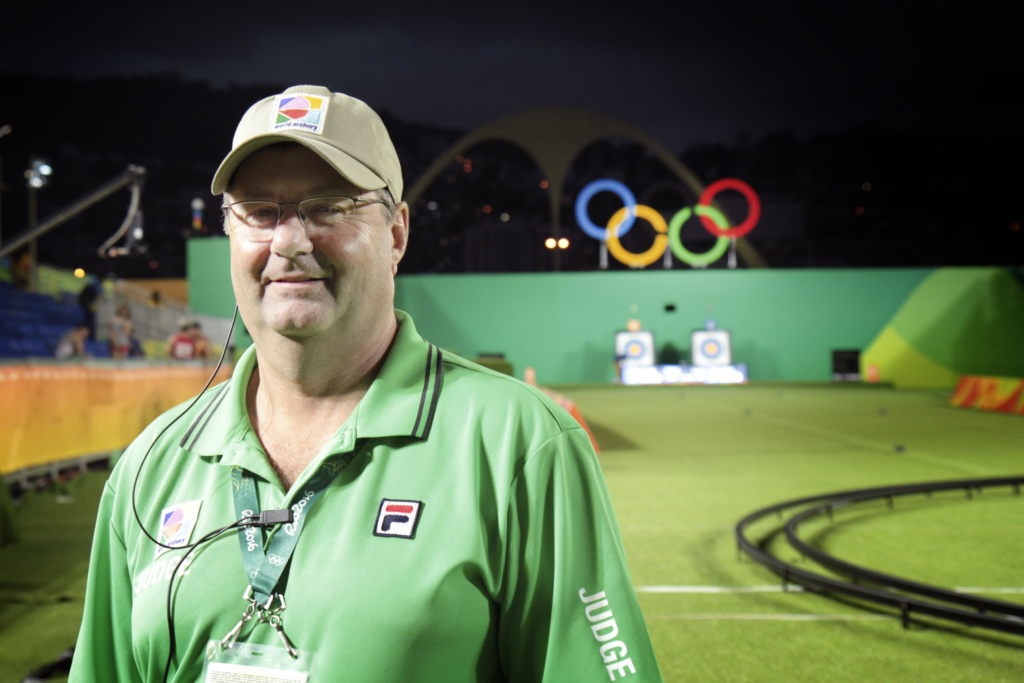Graham Potts has been at the forefront of international judging for a while, and was back in the technical team in Tokyo. He talks to Sophie Meering.
Tell us what you did in Tokyo
My role at these Games was as a member of the jury of appeal for archery. Basically, the jury has three members. We are there to take any appeal made by a team, or a formal appeal made by a team about a decision that they are allowed to appeal. Some things they can’t appeal, but if they are allowed to and they feel something has gone against them and it was wrong, they can make an appeal.
We will then sit and use the rule book to determine how we see what has happened. We would interview all the necessary and involved people, we would review the situation. Obviously, if it happens, we have to act fast because we are moving through matches quite quickly and we need to resolve situations as soon as we can.
It rarely happens but it is a necessityto have a jury of appeal should it occur, to make it correct and fair. So, we don’t get to be seen, we won’t be seen, it’s not a role that involves being on the field of play. It is one in which we are interested in what is happening all the time out there.
How did you get into international judging in the first place?
I was a national judge in the UK. I decided that I wanted to go further, having been involved in the organisational side of a couple of major events that we ran in here. I put myself forward to go to a continental judge seminar, so going through Europe first. I passed that and then I was active, I did an event.
I was able to go to a seminar in New Zealand to take my international judge exam, that was in 2006. That was just at the end of the year and it was the last available opportunity to get the international judge qualification to be eligible to judge at London [Olympic Games 2012].
That was how I got there, and actually why I wanted to get there. I wanted to be in that position of potentially judging an Olympic Games at that point, and it happened.
Tell us about your journey as a judge at the Olympic Games so far
In London I was a member of the judge team. The judges are actually called international technical officials for a Games. It was a home Games, which was excellent, and I had the privilege of being line judge for the men’s individual gold medal match, which was pretty good.
In Rio de Janeiro [2016] I had the role of chairman of the judges, head of the international technical officials. This encompassed the need to manage the team of technical officials and ensure we enabled the athletes to compete in a fair competition. It’s a pretty big honour to be able to lead the team. It’s an absolute privilege to be chosen for a role at the Olympics and the pride in doing so is absolutely immense. I’m just chuffed to bits.
What has been your favourite memory or experience from a Games so far?
Quite a lot of things are favourites from across Rio and London. In Rio some of the time it was the fact there were fabulous restaurants and places to eat in out there. – the great food and the great company. It is also the pride and pleasure in enabling my team to do a job well done by the end of the Games.
But if there is a standout for me, it’s being the line judge in London in the men’s individual gold medal match. I remember the big crowd, lots of noise going on, cameras clicking. It was huge and it took a lot of work to block some of it out so you could actually think what you were doing and do the job.
We were live on TV and it was about managing my own nerves, let alone anyone else’s, to ensure the match was shot in accordance to the rules. I had a huge adrenaline rush, which carried me through and enabled me to control what was happening. What made it all the more memorable as well was knowing my father was able to watch on TV and see me there; that made it really special.
How do you think this Games will compare with previous olympics?
It really was hugely different for everybody, not only the athletes, who have been having a very mixed approach to their training and so on. It’s been disjointed for them. It has also been disjointed for us, we’ve not had things to go to judge or officiate at. The biggest issue, probably for all of us, the big difference is going to be the inability of going out and enjoying the area, enjoy what Tokyo would want to put on for the visitors coming to this wonderful city and be a part of that.
It certainly wasn’t the same vibrancy, the enthusiasm that you get at an Olympic Games. The most important part is, however, that the athletes get the opportunity to perform on the greatest stage and the legacy of the Olympics can continue.
What do you enjoy the most about an event like this?
It is difficult to say. I always enjoy the camaraderie of everybody around, but I’ll take a line from Tom Dielen on this one because I rather like this and I think he’s right: “The journey home, because the journey home means we’ve had medals, we’ve had an Olympic Games, we’ve given medals out.”
That’s a great thing and it will be brilliant that we would have completed it in this situation, this time round. The biggest thing generally – and that has always been the case – is the people, the enthusiasm, the camaraderie. It’s being together with people from across the globe.
What advice do you give to anyone who wants to be an international judge?
New judges are always welcome, particularly in the UK. Do not try to run before you can walk is good advice too. It took me quite a while to get to this position – I’d been judging for 12 years or more before I became a continental judge. Bear in mind that you have to learn your trade. It’s an enjoyable thing, you get the opportunity to meet lots of people because you’re always working with different faces at different shoots.
If you’re interested in trying it, get in touch with the judges’ working group at your national federation. They can point you in the right direction and tell you who to talk to, give you guidance and get you on the right path. We are limited in how many continental and international judges we can have, but that shouldn’t stop people wanting to come forward. You can do an awful lot at national level and get a lot out of it; a lot of good feedback and enjoyment. And it’s great to sometimes walk off the field and think, “I did a good job today, the archers enjoyed it and I enjoyed it.” That’s what keeps me going.




